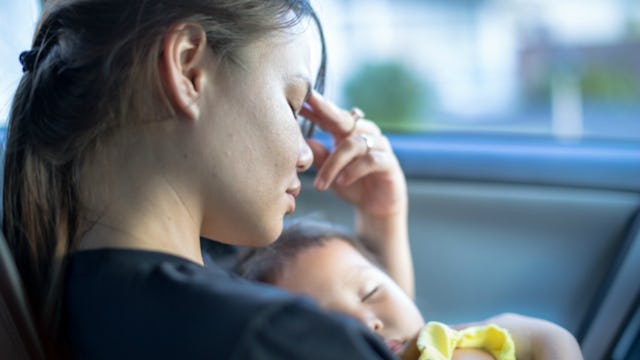New Study Finds Strong Link Between Postpartum Pain And PPD

The sobering truth is that 1 in 9 mothers will experience postpartum depression (PPD). The causes of PPD are multi-faceted, and often there is more than one trigger. Experts usually point to causes like hormone imbalances, traumatic births, difficult life circumstances, a previous history of depression or anxiety, and a lack of postpartum support.
Whatever the cause, PPD—especially untreated—can be devastating, and the sooner mothers get help, the better.
One overlooked cause, however, is the role that physical postpartum pain can play in the development of PPD. After speaking with a group of women about their experience with fourth degree tears after childbirth (where a postpartum vaginal tear extends to the anus or rectum), there was one unexpected commonality among them: postpartum depression.
Aside from high levels of unbearable pain as well as other life-changing ramifications like incontinence and the need for emergency surgeries, these mothers clearly and bravely described symptoms of PPD, as well as PTSD and severe anxiety.
Perhaps even more troubling is that these mothers often felt like their physical and emotional pain was dismissed, silenced, and stigmatized.
“Women injured traumatically during birth are overlooked, and as a result, feel overwhelmed. Told again and again that they’ll ‘forget the pain’ and to ‘enjoy the baby’ as they recover,” one mother told Scary Mommy. “That is our reality. And it needs to be talked about. It needs to be okay for us to accept this part of our lives.”
The good news is that it looks like the issue might finally be getting the attention it deserves. According to a new study conducted by the American Society of Anesthesiologists and recently presented at the Anesthesiology® 2018 annual meeting, pain after childbirth is strongly linked to the onset of PPD. Understanding how this plays out—and how to help mothers through it—might be a key factor in helping mothers heal from PPD.
As Science Daily explains in their summary of the study, previous research has found a link between childbirth pain and PPD, but this is the first time researchers have looked at postpartum pain and PPD—and the results are strong and convincing.
“For many years, we have been concerned about how to manage labor pain, but recovery pain after labor and delivery often is overlooked,” said Dr. Jie Zhou, lead author of the study. “Our research suggests we need to focus more on helping new mothers manage pain after the baby is born.”
Bingo. So many women are left in the dark after having babies. They are expected to handle the whole thing—including their very own physical recovery—on their own. That’s hard enough when you aren’t dealing with extreme pain. But imagine if you are. How incredibly difficult could it be to manage that level of pain while caring for a newborn?
So how did the researchers come to this conclusion? Dr. Zhou and his team looked at pain scores from 4,327 first-time moms who delivered either vaginally or via C-section at Brigham and Women’s Hospital. They compared these mom’s pain scores with their Edinburgh postnatal depression scale (EPDS) scores at one week postpartum.
The researchers found that moms who scored high for PPD also scored high on the pain scale, leading Dr. Zhou and his team to note that PPD was “significantly associated” with increased levels of postpartum pain.
Moms with high pain levels generally had a few key things in common. First, they were more likely to request pain relievers postpartum (as well they damn well should). Other commonalities between these mothers was that they were more likely to have had C-sections, vaginal tearing, and a history of depression, anxiety, or chronic pain.
I mean, all of this makes total sense, right? How on earth can you deal with the already overwhelming shit-storm of new motherhood when you are in pain? We talk about “mothering the mother” and how “you can’t pour from an empty cup,” but the truth is that we are doing a pretty poor job of addressing things like postpartum pain in new mothers, as Dr. Zhou and his team pointed out.
“While ibuprofen and similar pain medications are considered adequate for pain control after childbirth, clearly some women need additional help managing pain,” said Dr. Zhou. “We need to do a better job identifying who is at risk for postpartum pain and ensure they have adequate postpartum care.”
Exactly. Not only do we need to treat the pain more adequately, but doctors and healthcare providers need to give space for mothers to safely relay their feelings. And mothers need to be listened to and respected when they say that something hurts, or something isn’t quite right.
How many of us were even asked about our postpartum pain? Most of us leave the hospital and aren’t contacted by a doctor for six weeks. Many of us have felt silenced or shamed when we voiced a concern about a postpartum ailment—physical or emotional.
The stigma needs to end. Moms need better, kinder, more comprehensive postpartum care. Pain and PPD need to be taken with utmost seriousness. No mom deserves to suffer, for any amount of time, ever. We can—and must—do better.
This article was originally published on